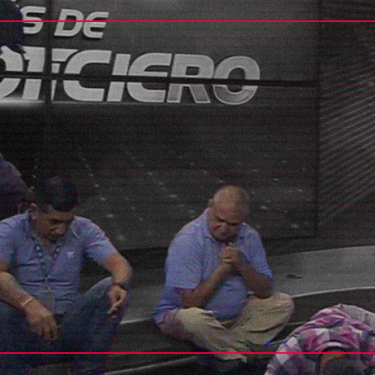Hostage-taking during live TV newscast highlights wave of violence against Ecuador’s media

Thirteen gunmen stormed into the studios of the public TV channel TC Televisión in Ecuador’s largest city, Guayaquil, and took journalists and other employees hostage during a live newscast on 9 January. Reporters Without Borders (RSF) calls on the government to guarantee the protection of media professionals, whose role is more fundamental than ever in times of crisis.
RSF strongly condemns the hostage-taking of journalists, an act of terror that has highlighted the disastrous security situation for journalists in Ecuador. A surge in violence, threats and hostility towards the media has accompanied an increase in the strength of criminal gangs and drug cartels in the country in recent years. We call on President Daniel Noboa’s government to do everything possible to ensure that journalists and news media are protected. Guaranteeing the right to news and information is fundamental in times of crisis such as Ecuador is experiencing
The 13 heavily-armed, masked drug traffickers stormed into state-owned TC Televisión’s local studios in the southeastern city of Guayaquil, on Tuesday 9 January, shortly after 2 p.m., as the “El Noticiero” news programme was being broadcast live, and took journalists and other employees hostage. The attack was carried live, and viewers could hear gunshots and the cries of the hostages.
At around 2:45 p.m., after tense negotiations with police and Ecuadorian army special forces, the 13 gunmen laid down their weapons, released the hostages and were arrested. The TV channel’s signal was immediately disconnected.
Media alarmed by security situation
Ecuador is in the throes of a major crisis. The authorities declared a “state of internal armed conflict” on 9 January, following the state of emergency announced on 7 January, with an 11 p.m. to 5 a.m. curfew throughout the country.
In this climate of extreme tension – fuelled by prison mutinies, prison breakouts by gang chiefs, and abductions of police officers – the media also feel under pressure. As soon as the news of the attack on TC Televisión broke, Guayaquil’s leading media outlets evacuated their personnel and redoubled their precautions. On Wednesday 10 January, their doors were closed and staff were on guard. Only media guests were allowed in. Military forces have surrounded the media installations.
As well as the growing threats to their security, Ecuador’s journalists are also having to grapple with a surge in disinformation on the country’s social media. Rumours of an attack on the University of Guayaquil, quickly denied by the authorities, and rumours of hostage-taking on the Quito metro have been circulating.
Ecuador is ranked 80th out of 180 countries in RSF's 2023 World Press Freedom Index after suffering a 12-place fall, one of the biggest in the region.
